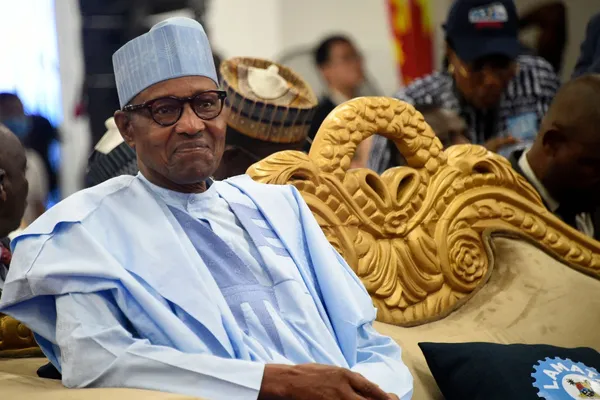When Muhammadu Buhari assumed office in 2015, many Nigerians expected an economic turnaround. But eight years later, his administration left behind a complicated legacy marked by debt accumulation, weak economic growth, and deepening poverty.
Buhari took over during a collapse in global oil prices, from $111 per barrel in May 2014 to $40 by late 2015, sending Nigeria’s oil-dependent economy into disarray.
The Jonathan-Buhari transition period exposed the fragility of Nigeria’s macroeconomic fundamentals. While the Jonathan government had defended the naira with reserves, Buhari entered with a weakened economy and failed to act swiftly to stabilize it.
By late 2015, Nigeria’s economic growth had decelerated sharply to 2.35%, far below the 6.54% recorded a year earlier. Instead of early intervention, the Buhari government’s slow budget passage and delayed appointments signaled a lack of urgency in rescuing the economy, leading to a full-blown recession by Q2 2016.
As state governments crumbled under wage arrears and weak industrial bases, Buhari’s administration became a fiscal lifeline. With interventions like Paris Club refunds, road repayment funds, and commercial loan restructuring, the Federal Government injected trillions into state treasuries.
This approach, however, relied heavily on printing money via the Central Bank’s “Ways and Means” facility, which ballooned to over ₦25 trillion by 2023. It created temporary liquidity but left long-term inflationary pressures and monetary instability.
To jumpstart the economy, the Buhari administration launched the Economic Recovery and Growth Plan (ERGP) in 2017. Capital spending surged to ₦1.66 trillion in 2018, but with inadequate revenue mobilization, deficits widened dangerously.
When COVID-19 hit in 2020, Nigeria was unprepared and re-entered recession, contracting by -3.62% in Q3 2020. The government responded with a ₦500 billion stimulus and Central Bank support exceeding ₦150 billion, but these measures failed to spark a robust recovery.
Between 2016 and 2022, total government revenue stood at ₦26.67 trillion, while expenditure hit ₦60.64 trillion, leaving a staggering deficit of ₦33.97 trillion. Domestic debt soared from ₦8.84 trillion to ₦44.91 trillion, and external debt spiked from $7.35 billion to $37.2 billion.
The result was a national debt profile that grew from ₦42 trillion to ₦77 trillion under Buhari’s watch. With debt servicing costs rising from ₦1.06 trillion in 2015 to ₦5.24 trillion in 2022, Nigeria’s debt-service-to-revenue ratio jumped from 29% to an alarming 96%.
The Central Bank of Nigeria became an outsized player, pushing money supply from ₦18 trillion in 2015 to ₦55 trillion in 2023. This aggressive liquidity expansion led to a spiral in inflation, which hit 22.5%, with food inflation reaching 24% by April 2023.
Programs like the Anchor Borrowers’ Scheme received over ₦800 billion but faced severe repayment issues and failed to tame food inflation or boost agricultural productivity. Meanwhile, unemployment surged from 10.4% to 33.4%, driven by a weak private sector and confusing FX policies.
Buhari’s refusal to eliminate fuel subsidies, despite spending at least ₦10 trillion on them, exposed fiscal waste and indecision. Even when oil prices reached $114 per barrel in 2022, Nigeria failed to capitalize, as production fell below 1 million barrels per day.
Despite these macroeconomic woes, Buhari’s era saw a flurry of infrastructure spending. Landmark projects include the Lagos-Ibadan railway, Abuja-Kaduna rail line, and Warri-Itakpe route, alongside roads like the Apapa-Oshodi Expressway and Bodo-Bonny bridge.
He also launched the Ajaokuta-Kaduna-Kano gas pipeline and invested in airport terminals and military hardware like Super Tucano jets.
Social indicators showed no progress, as 133 million Nigerians slipped into multidimensional poverty during his presidency.
Policy wins like the Petroleum Industry Act, Road Tax Credit Scheme, and Nigerian Startup Act aimed to reshape regulatory frameworks. But weak execution, misallocation of funds, and poor oversight blunted their long-term effectiveness.
Even in energy reform, the much-hyped Siemens Power Program and $1 billion spent on the Port Harcourt refinery failed to deliver immediate dividends. Buhari’s statist tendencies prioritized spending over sustainability, further burdening public finances.
His administration also expanded development banking, with the Bank of Industry issuing trillions in loans and new banks lending over ₦400 billion. But loan transparency and impact assessment remain questionable.
By the end of his tenure, inflation stood at 22.4%, public debt nearly doubled to 35% of GDP, and the naira had weakened significantly. Nigerians’ real incomes and savings eroded, leaving the economy fragile and the population more vulnerable.
Buhari’s currency redesign effort, executed poorly in his final days, created liquidity crises and public chaos. It underscored the lack of coordinated macroeconomic planning that haunted his two terms in office.
In conclusion, while Buhari invested heavily in infrastructure and attempted key policy reforms, his legacy is overshadowed by unchecked debt, spiraling inflation, and a deteriorated standard of living. His economic stewardship reminds Nigerians that spending alone cannot substitute for sound, coherent, and disciplined economic management.

